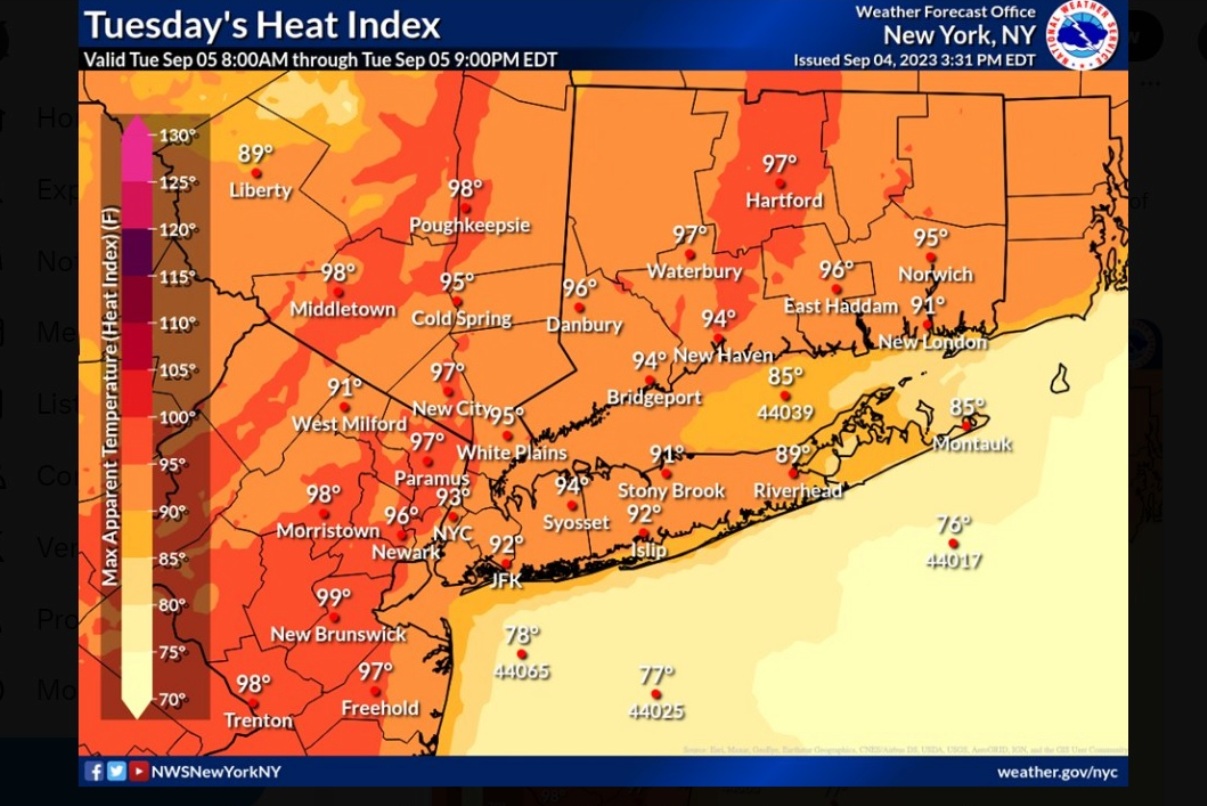
By Andres Correa
05 Sep 2023, 11:11 AM EDT
An unusual heat wave is being experienced today and will continue until Thursday in New York and other areas of the country, causing a weather alert more typical of July or August than of September.
In NYC, more than 500 cooling centers across the five boroughs have reopened for residents to beat the heat and humidity in air-conditioned spaces. Con Edison urged New York customers to use energy wisely to avoid possible overloads on the grid.
“People are probably already thinking about fall and we’re done with it (summer), so to speak, but that’s certainly not the case this year,” National Weather Service (NWS) meteorologist Dominic Ramunni said. by Gothamist.
The projected highs for Tuesday, Wednesday and Thursday in Central Park – considered the average zone for NYC weather – are expected to be around 91F (33C), and tomorrow especially could be the worst day. The extra moisture makes temperatures feel even hotter.
The thermometer could break records for this time if they exceed 93 or 94 degrees F (34C). “Maximum heat indices basically every day can top out near 100 degrees F (38C) in some places, so obviously this is some of the hottest weather we’ve seen,” Ramunni said. “It could be some of the hottest air we’ve dealt with this year.”
In NYC there are more than 500 cooling centers where the population can take shelter from the heat. To find the closest one, the access rules -some are only for seniors- and the hours of operation, New Yorkers can call 311 or visit this portal. Many public pools are also open throughout the five boroughs from 11 am to 7 pm (they close for one hour for sanitation from 3 to 4 pm) and there are active cooling fountains in various plazas, parks and streets. FDNY reminds that fire hydrants can only be legally opened by its personnel.
In New York City, most heat-related deaths occur in homes or other spaces without air conditioning. But some people don’t have equipment or don’t turn it on because of high cost of electric bill or other reasons.
Weather updates can be found here and on the National Weather Service (NWS-NY) website. More details here about the forecast in New York and Jersey counties and on this page of NBC News Weather.
When there is extreme heat, the authorities ask New Yorkers not only to take care of themselves individually but also to be aware of their neighbors and relatives, especially babies, the elderly and people with risk illnesses.
How to beat the heat in a city as congested as New York?
Under no circumstances leave children and pets locked in a car, as this can be fatal, even within minutes. The American Academy of Pediatrics warns that the internal temperature of a car, regardless of whether the windows are closed or open, can rise as much as 40 degrees F (4.5C) in an hour, even if the thermometer outside reads about 70F (21C). Most of the temperature rise occurs within the first 15-30 minutes, and no amount of shade is enough to protect children from these dangers, FDNY notes.
Tips to prevent and treat hyperthermia (high body temperature):
- Drink enough liquid during the day, both water and vegetable and fruit juices. Avoid coffee and alcohol.
- If your home does not have air conditioning or fans, keep the shades and windows closed during the day and open at night.
- Avoid the sun. Prolonged exposure always has negative consequences.
- Try to wear cotton clothes or natural, fresh and light fabrics, and avoid synthetic fibers and dark colors.
- Do not exercise outdoors and avoid crowded places during peak heat hours. It is considered that around 3:00 pm is the hottest time of the day.
Additionally, to avoid power outages and fires, Con Ed recommends:
- Limit the use of large appliances, such as washers, dryers, dishwashers, and microwaves, between the hours of 2 and 10 p.m.
- Use only one large appliance at a time in the home.
- Limit the use of air conditioning whenever possible. If you have multiple computers, turn on only one.
- Use fans to help circulate air. If you open the windows or balconies, do not leave children unsupervised. Carefully check window guards periodically. Lids or screens are not safe substitutes.
- Turn off the air conditioner when you’re not home and use a timer to start cooling half an hour before you arrive. Set the highest temperature that is comfortable for you.
With today’s heat advisory, we remind everyone not to forget about their four-legged family members. Don’t leave them outside all day or leave them in a vehicle without proper ventilation. pic.twitter.com/OFcr4gyHB8— NYPD NEWS (@NYPDnews) July 27, 2023
